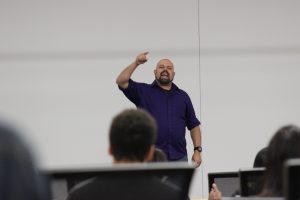To share his experience in slam poetry, sophomore nursing major Michael Miller hosted a slam poetry workshop, in which he shared his experience and history working on the art form. In 2007, he said he began participating in slam poetry competitions under his alias, DDE The Slammer. Through slam poetry Miller has traveled around the United States and Germany on tour.
“I’ve done everything from little, local twenty-five dollar slams to slams with a grand prize of two thousand dollars,” Miller said. “I left an office job and did this for a couple years. Since then, it’s been a way to kind of refine myself, to push myself.”

Miller opened the evening by defining slam poetry. Founded by American Poet Marc Smith, slam is a competition in which writers perform spoken word poetry and are critiqued by a series of judges. The poet has to perform his or her piece in under three minutes, with a ten second grace period. Afterwards, the judges score the piece and the performance on a scale of one to ten. Miller noted that slam poetry is distinctly different from an open mic, because an open mic is not a competition.
“Open mic is just you reading your things,” Miller said. “Slams are great because they stop people from doing seven minute poems. I was once at an open mic where someone did a seven minute poem. They were at seven minutes, and when they switched the page again, we all started clapping really loud, and wouldn’t stop clapping until they got offstage.”
Miller discussed a wide array of topics covered by slam poets, from food products to more serious subjects like discrimination and rape. He noted that the majority of his poems tend to lean more towards the social justice route. Being a Mexican immigrant, the ability to share his experiences through slam poetry has been therapeutic both for him and, on occasion, his audiences.
“It’s a way to get things off your chest that you aren’t just gonna have a conversation about. You can… let people know, ‘hey, I’ve been through this,’ or ‘hey, I’ve been through what you’ve been through,’” Miller said. “Some people hear it and get healing from it.”
Miller shared two poems. One was “Royalty Reality Check,” a commentary on the treatment and perception of blacks and Latinos in America. This poem, featured on YouTube, also got him on the television program Verses and Flow, which specializes in showcasing spoken word and musical performances from poets and R&B singers. Miller said he owes quite a bit to slam poetry.
“It’s allowed me to travel. It has allowed me to meet some very close personal friends,” Miller said. “It’s kind of made me reevaluate my viewpoint on things, and helped me grow as a person.”
Miller had a few tips for those starting out in the slam poetry scene. One was to study the craft carefully, whether by watching YouTube videos or attending slams poetry events. After studying, it is important to go out and actually perform, and not get discouraged if one does not automatically achieve the desired outcome.
“You have to have a joy to do it, and you have to want to do well at it,” Miller said. “I think that it’s more important to want to do well than to focus just on winning.”
Sophomore communication major Hilary Bauer said she enjoyed the event because she has many friends who participate in slam.
“To gain a basic knowledge of slam [poetry] and its culture was cool and eye opening,” Bauer said. “It allowed me to gain a deeper appreciation for slam as a form of expression. As someone who loves word play and language, I admire how these people use words, sounds, and meanings to convey a specific feeling or emotion about an issue in society.”
Miller encouraged those in the audience to get involved in the slam poetry scene, citing numerous slams happening throughout Indiana, such as Poetry on the Fringe, Iconoclast, That PEACE Open Mic, the Indianapolis Poetry Slam and Soul Food Sundays.
Miller currently hosts Poetry on the Fringe, which takes place every other Sunday at 6 p.m. at the Indy Fringe Theater. Miller said he hopes to revitalize the Indiana slam poetry scene one step at a time.
“I think it helps you grow,” Miller said. “Think that poetry in itself is a really good outlet, in a way that you can educate people and let them know that you’ve experienced what they’ve experienced.”







